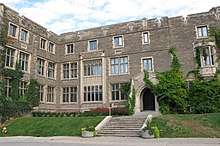|
McMaster Faculty of Science
The Faculty of Science is the largest of six faculties at McMaster University in Hamilton, Ontario, Canada. Founded in 1962, the faculty is located in the Westdale neighbourhood.[1] It houses 6,800 undergraduate students and 600 graduate students, across 39 upper-year undergraduate programs ranging from astrophysics, biochemistry, earth and environmental sciences, to life sciences, human behaviour, kinesiology and medical and radiation sciences.[1] Notable discoveries at McMaster University include the development of neutron spectroscopy by Bertram Brockhouse which earned him a Nobel Prize in Physics in 1994.[2] Under the presidency of Dr. H.G. Thode in the 1960s, scientific research at McMaster was intensive and yielded important discoveries in the areas of science and engineering. In 1959, McMaster's Nuclear Reactor was built for the purpose of nuclear and medical radiation research. McMaster is the only Canadian university that contains a nuclear reactor in their campus. Scientific research at McMaster University earned the university high rankings in the areas of research and strength in science, where it is ranked seventh in Canada and 212th in the world according to QS University Rankings 2017 for Natural Sciences.[3] Departments, Schools and Programs of the Faculty of ScienceThere are 7 departments and 2 interdisciplinary schools in the Faculty of Science:
Academic programsA co-op (or cooperative education) option is offered in 14 undergraduate science programs: Actuarial & Financial Mathematics, Biochemistry, Biology & Pharmacology, BioPhysics, Chemical Biology, Chemistry, Earth & Environmental Sciences, Environmental Sciences, Life Sciences, Mathematics & Statistics, Medical & Health Physics, Molecular Biology & Genetics and Physics. The term "cooperative education" emphasizes the partnership between the employer, the student and university. Students taking the science co-op option have 4 work terms employed in their field in addition to the regular academic requirements. The co-op program is typically completed in 5 years. The Medical Radiation Sciences program is offered in collaboration with Mohawk College as part of the School of Interdisciplinary Sciences. It prepares students to practice as either a radiographer, sonographer, or radiation therapist, and includes three mandatory, semester-long clinical placements. Students graduate with both an Honours Bachelor of Medical Radiation Sciences and an Ontario College Advanced Diploma. The Faculty of Science offers Masters and PhD degrees in 16 graduate programs. Deans of Science
Scientific ResearchThere are currently 6 Funded and Endowed Research Chairs, 19 Canada Research Chairs, and 3 Faculty of Science Research Chairs in the Faculty of Science.[1] Centres, Institutes and FacilitiesThe Faculty of Science hosts or supports several research-based centres and institutes that feature integrated, multi-disciplinary work.[1]
References
External links |
||||||||||||||||||||||||||||||||||||||||||
